Procedure 5.1.1.2 - High School Student Enrollment
Education Services through Career and College Promise (Curriculum)
The College provides seamless opportunities for high school students to get a head start with their college education by enrolling in eligible pathways through Career and College Promise (“CCP”). Enrollment in identified courses is available to students enrolled in public and private schools (including home schools) through articulation agreements between the school system and the College and approved by the North Carolina Community College System Office.
The purpose of Career and College Promise is to offer structured opportunities for qualified high school students to dually enroll in community college courses that provide pathways that lead to a certificate, diploma, or degree as well as provide entry-level jobs skills. Academic credits earned through Career and College Promise shall enable students who continue into postsecondary education after graduating from high school to complete a postsecondary credential in less time than would normally be required. All previous high school transition programs, including Huskins, Concurrent Enrollment, Cooperative and Innovative High Schools, Learn and Earn, and Learn and Earn Online were consolidated and replaced by Career and College Promise. Students may secure additional information about enrolling in these programs at the College website: https://www.haywood.edu/programs/index.php#hsp
CCP Overview
The major purpose of community colleges is to serve students who have graduated from high school or are beyond the compulsory age limit of the public school and have left public school. However, a minor may seek admission to a community college subject to the conditions in this Section.
Career and College Promise is a dual enrollment program for eligible North Carolina high school students. Community colleges may collaborate with local school administrative units to offer courses through the following Career and College Promise program pathways:
-
A College Transfer Pathway approved by the State Board of Community Colleges including transfer courses in English and mathematics;
-
A Career and Technical Education Pathway leading to a certificate, diploma or degree;
-
Career and Technical Education – Workforce Continuing Education leading to a State or industry-recognized credential. CCP rules applicable to Workforce Continuing Education are provided in 1D SBCCC 300.4(c)(1)(D).
-
A Cooperative Innovative High School Pathway approved under Part 9 of Article 16 of Chapter 115D of the North Carolina GeneralStatutes.
Refer to approved pathways in current catalog.
Tuition is waived for CCP students; however, all CCP students except for those in Cooperative Innovative High School Programs, must purchase their own textbooks and supplies required for their classes. CCP students must obtain a student ID and parking pass.
All non-self-supporting curriculum courses taken by high school students at community colleges in accordance with this Section are tuition-waived.
High school students may not audit courses offered under the Career and College Promise Program.
High school students enrolled in a College Transfer Pathway or a Career and Technical Education Pathway may not enroll in developmental education courses but may enroll in supplemental courses. For the purposes of this section, the phrase “supplemental courses” shall have the same meaning as in 1D SBCCC 400.8(b)(1).
CCP Pathways
College Transfer Pathway (Juniors and Seniors)
-
To be eligible for enrollment in a College Transfer Pathway, a high school student must:
-
Be a high school junior or senior as designated by the local educational agency; and
-
Have an unweighted high school GPA of 2.8; or
-
Demonstrate college readiness in English, reading, and mathematics by meeting benchmarks on diagnostic assessment tests, which have been approved by the State Board of Community Colleges.
-
-
To maintain eligibility for continued enrollment in the pathway, a student must:
-
Continue to make progress toward high school graduation as outlined in G.S. 115C-105.35 and
-
Maintain a 2.0 GPA in college coursework after completing twocourses.
-
-
A student who falls below a 2.0 GPA after completing two college courses will be subject to the college’s policy for satisfactory academic progress.
-
A student may only enroll in one College Transfer Pathway program of study. Course substitutions may be approved by the chief academic officer for individual students. Course substitutions for individual students must be documented and maintained on file.
-
A student may change the student’s pathway major with approval of the high school principal or the high school principal’s designee and the college’s chief student development administrator or the college’s chief academic officer. The college’s chief student development administrator or the college’s chief academic officer shall approve a change in pathway based on verification that the program change allows the student to meet their newly chosen career path.
-
High school students in the CCP College Transfer Pathways must complete the entire pathway before taking additional courses in the Associate degree with the exception of mathematics courses.
-
With approval of the high school principal or the high school principal’s designee and the college’s chief student development administrator or the college’s chief academic officer, a student who completes a College Transfer Pathway, while still enrolled in high school, may continue to earn college transfer credits leading to the completion of the Associate in Arts, Associate in Science, Associate in Engineering, Associate in Fine Arts in Visual Arts or Associate in General Education Nursing degree.
-
With the approval of the high school principal or the high school principal’s designee and the college’s chief student development administrator or the college’s chief academic officer, a student may enroll in both a College Transfer Pathway and a Career Technical Education (CTE) pathway.
-
A student may change the student’s program of study major with approval of the high school principal or the high school principal’s designee and the college’s chief student development administrator or the college’s chief academic officer. The college’s chief student development administrator or the college’s chief academic officer shall approve a change in pathway based on verification that the program change allows the student to meet their newly chosen career path.
-
The college may award the Associate in Arts, Associate in Science, Associate in Engineering, Associate in Fine Arts, or Associate in General Education – Nursing to the Career and College Promise student prior to high school graduation.
-
Students pursuing credits beyond the initial transfer associate degree must provide documentation of justification based upon career pathway needs or transfer program requirements (i.e. bachelor degree plan published by the university). The high school principal or the high school principal’s designee and the college’s chief student development administrator or the college’s chief academic officer must approve prior to enrollment in credits beyond the initial transfer program. Approval is contingent upon the student’s documentation of justification based upon career pathway needs or transfer program requirements.
College Transfer Pathway (Freshman and Sophomores)
To be eligible for enrollment, a high school student must meet the following requirements:
-
Be a high school freshman or sophomore; and
-
Be identified as academically or intellectually gifted in English, reading and math as outlined in the local board of education’s Academically and 13 Intellectually Gifted (AIG) local plan (General Statute 115C-150.7.); or
-
Be identified as academically or intellectually gifted in English, reading, and math on an aptitude and achievement test as evidenced by a score in the range between the 92nd percentile and the 99th percentile on an aptitude and an achievement test included in the Mental Measurements Yearbook published by the Buros Institute of Mental Measurements; and
-
-
Demonstrate college readiness in English, reading, and mathematics by meeting benchmarks on diagnostic assessment tests which have been approved by the State Board of Community Colleges; and
-
Have the maturity to justify admission to the community college, as demonstrated by obtaining all of the following:
-
A recommendation from the student’s principal or equivalent administrator explaining why they believe the student has the requisite maturity to enroll at the community college;
-
A recommendation from the academically gifted coordinator, if one is employed by the high school or local school administrative unit, explaining why they believe the student has the requisite maturity to enroll at the community college; and
-
Approval to enroll by the community college president or their designee. Prior to requesting approval by the community college president or their designee, the student must deliver the recommendations described in (A) and (B) to the community college president or their designee.
-
-
Have the written consent of the student’s parent or guardian granting permission for the student to participate in the program; and
-
The student must participate in academic advising with representatives from the high school and community college prior to enrollment in the program. This advising shall be focused on the implications of being admitted to college early. (m) Maintaining Eligibility for Continued Enrollment, Changing Pathways, and Other Rules Applicable to College Transfer Pathways
-
To maintain eligibility for continued enrollment in the pathway, a student must:
-
Continue to make progress toward high school graduation as outlined in G.S. 13 115C-105.35 and
-
Maintain a 2.0 GPA in college coursework after completing two courses.
-
-
A student who falls below a 2.0 GPA after completing two college courses will be subject to the college’s policy for satisfactory academic progress.
-
A student may change the student’s pathway major with approval of the high school principal or the high school principal’s designee and the college’s chief student development administrator or the college’s chief academic officer. The college’s chief student development administrator or the college’s chief academic officer shall approve a change in pathway based on verification that the program change allows the student to meet their newly chosen career path.
-
High school students in a College Transfer Pathways must complete the entire pathway before taking additional courses in the Associate degree with the exception of mathematics courses.
-
With approval of the high school principal or the high school principal’s designee and the college’s chief student development administrator or the college’s chief academic officer, a student who completes a College Transfer Pathway, while still enrolled in high school, may continue to earn college transfer credits leading to the completion of the Associate in Arts, Associate in Science, Associate in Engineering, Associate in Fine Arts in Music, Associate in Fine Arts in Theater, Associate in Fine Arts in Visual Arts or Associate in General Education Nursing degree.
-
With the approval of the high school principal or the high school principal’s designee and the college’s chief student development administrator or the college’s chief academic officer, a student may enroll in both a College Transfer Pathway and a Career Technical Education Pathway.
-
A student may change the student’s program of study major with approval of the high school principal or the high school principal’s designee and the college’s chief student development administrator or the college’s chief academic officer. The college’s chief student development administrator or the college’s chief academic officer shall approve a change in pathway based on verification that the program change allows the student to meet their newly chosen career path.
-
The college may award the Associate in Arts, Associate in Science, Associate in Engineering, Associate in Fine Arts, or Associate in General Education – Nursing to the Career and College Promise student prior to high school graduation.
-
Students pursuing credits beyond the initial transfer associate degree must provide documentation of justification based upon career pathway needs or transfer program requirements (i.e. bachelor degree plan published by the university). The high school principal or the high school principal’s designee and the college’s chief student development administrator or the college’s chief academic officer must approve prior to enrollment in credits beyond the initial transfer program. Approval is contingent upon the student’s documentation of justification based upon career pathway needs or transfer program requirements.
-
Career Technical Education Pathway (CTE) (Juniors and Seniors)
-
To be eligible for enrollment, a high school student must:
-
Be a high school junior or senior; and
-
Have an unweighted GPA of 2.8 on high school courses; or
-
Demonstrate college readiness in English, reading, and mathematics by meeting benchmarks on diagnostic assessment tests which have been approved by the State Board of Community Colleges.
-
Juniors or seniors who do not meet the eligibility requirements in 1D SBCCC 400.11(l)(1)(A) – (C) shall have the recommendation of the high school principal or the high school principal’s designee and the college’s chief student development administrator or the college’s chief academic officer. A recommendation is only allowed for entry into Career and College Promise Career and Technical Education pathway that does not include Universal General Education Transfer Component (UGETC) courses.
-
-
College Career Technical Education courses may be used to provide partial or full fulfillment of a four-unit high school career cluster. The college will grant articulated credit to students based on the then-current local or state North Carolina High School to Community College articulation agreement.
-
To maintain eligibility for continued enrollment, a student must:
-
Continue to make progress toward high school graduation as outlined in G.S. 115C-105.35, and
-
Maintain a 2.0 in college coursework after completing two courses.
-
-
A student who falls below a 2.0 GPA after completing two college courses will be subject to the college’s policy for satisfactory academic progress.
-
Course substitutions may be approved by the chief academic officer for individual students. The college will document course substitutions for individual students and maintain those course substitutions in the student’s file.
-
With approval of the high school principal or the high school principal’s designee and the college’s chief student development administrator or the college’s chief academic officer, a Career Technical Education Junior or Senior may concurrently enroll in two Career and Technical Education Pathways or in one College Transfer Pathway and one Career Technical Education Pathway.
-
The student may change the student’s pathway major with approval of the high school principal or the high school principal’s designee and the college’s chief student development administrator or the college’s chief academic officer. The college’s chief student development administrator or the college’s chief academic officer shall approve a change in pathway based on verification that the program change allows the student to meet their newly chosen career path.
-
With approval of the high school principal or the high school principal’s designee and the college’s chief student development administrator or the college’s chief academic officer, a student who completes the Career and Technical Education certificate or diploma may continue in the same traditional associate in applied science program as long as they are still eligible for the Career and College Promise program. The high school principal or the high school principal’s designee and the college’s chief student development administrator or the college’s chief academic officer must approve prior to enrollment in credits beyond the initial Career and Technical Education program. Approval is contingent upon documentation that the credits beyond the initial program allow the student to support the student’s chosen career path (i.e. a career pathway plan).
-
The college may award the certificate, diploma, or degree to the Career and College Promise student prior to high school graduation.
Career Technical Education Pathway (Freshmen and Sophomores)
-
Colleges may enroll eligible high school Freshman and Sophomores only in industrial technologies (program code 50xxx), engineering technologies (program code 40xxx), agriculture and natural resources (program code 15xxx), and transportation (program code 60xxx), construction (program code 35xxx), and business technologies (program codes 25xxx) certificate and diploma programs.
-
Freshmen and Sophomores may not enroll in Career and Technical Education pathways that include Universal General Education Transfer Component (UGETC) courses.
-
To be eligible for enrollment, a high school student must be a high school Freshman or Sophomore. A Freshman or Sophomore must:
-
Have passed Math I with a grade of “C” or better;
-
Test college-ready in mathematics as determined by the assessment given by the North Carolina Department of Public Instruction;
-
Test college-ready in English and reading as determined by the assessment given by the North Carolina Department of Public Instruction;
-
Have received information outlining program requirements for completion of the certificate or diploma; and
-
Have the recommendation of the high school principal or the principal’s designee and the college’s chief student development administrator or the college’s chief academic officer; or
-
Demonstrate college readiness in English, reading and mathematics by meeting benchmarks on diagnostic assessment tests which have been approved by the State Board of Community Colleges and have the recommendation of the high school principal or the high school principal’s designee and the college’s chief student development administrator or the college’s chief academic officer.
-
-
College Career Technical Education courses may be used to provide partial or full fulfillment of a four-unit career cluster. The college will grant articulated credit to the students based on the then-current local or state North Carolina High School to Community College articulation agreement. To maintain eligibility for continued enrollment, a student must:
-
Continue to make progress toward high school graduation, and
-
Maintain a 2.0 in college coursework after completing two college courses. A student who falls below a 2.0 GPA after completing two college courses will be subject to the college’s policy for satisfactory academicprogress.
-
-
A student must enroll in one pathway and may not substitute courses in one pathway for courses in another.
-
The student may change the student’s pathway major to another eligible program of study with approval of the high school principal or the high school principal’s designee and the college’s chief student development administrator or the college’s chief academic officer. The college’s chief student development administrator or the college’s chief academic officer shall approve a change in pathway based on verification that the program change allows the student to meet their newly chosen career path.
-
A student may concurrently enroll in two Career and Technical Education Pathways in allowable program areas provided the exception has been approved by the college’s chief student development administrator or the college’s chief academic officer. The college’s chief student development administrator or the college’s chief academic officer shall approve an exception if concurrent pathways are aligned to the student’s career pathway interest and careergoals.
-
-
With approval of the high school principal or the high school principal’s designee and the college’s chief student development administrator or the college’s chief academic officer, a student who completes a Career Technical Education pathway, while still enrolled in high school may continue to earn college credits leading to the completion of a higher-level credential within the same program code. The college’s chief student development administrator or the college’s chief academic officer shall approve the continuation if the credential is in the same program code.
-
With approval of the high school principal or the high school principal’s designee and the college’s chief student development administrator or the college’s chief academic officer, a student who completes the Career and Technical Education certificate or diploma may continue in the same traditional associate in applied science program as long as they are still eligible for the Career and College Promise program.
-
The college may award the certificate, diploma, or degree to the Career and College Promise student prior to high school graduation.
-
The high school principal or the high school principal’s designee and the college’s chief student development administrator or the college’s chief academic officer must approve prior to enrollment in credits beyond the initial Career and Technical Education program. Approval is contingent upon documentation that the credits beyond the initial program allow the student to support the student’s chosen career path (i.e. a career pathway plan).
Cooperative Innovative High School Programs (CIHSP)
-
Cooperative Innovative High School Programs are jointly established by local boards of education and local boards of trustees.
-
CIHSP enroll 100 or fewer students per grade level.
-
Students enrolled in CIHSP have the opportunity to complete an associate degree program, diploma, certificate, or earn up to two years of college credit while completing a high school diploma within five years.
-
A CIHS student may enroll in (with approval by the HEC Principal and Chief Academic Officer)
-
One College Transfer program ofstudy;
-
One College Transfer program of study and one Career and Technical Education (CTE) program of study; or
-
Two Career and Technical Education (CTE) programs of study.
-
-
Students pursuing credits beyond the initial transfer associate degree must provide documentation of justification based upon career pathway needs or transfer program requirements (i.e. bachelor degree plan published by the University of North Carolina). The high school principal or the high school principal’s designee and the college’s chief student development administrator or the college’s chief academic officer must approve prior to enrollment in credits beyond the initial transfer program of study. Approval is contingent upon documentation of justification based upon career pathway needs or transfer program requirements (i.e. bachelor degree plan published by the University of North Carolina).
-
CIHSP are located on college campuses. A school shall obtain approval from the State Board of Community Colleges for exceptions to this requirement. Exceptions are based on local needs as outlined in the location waiver request. The approved waiver shall be maintained locally for documentation. The State Board of Community Colleges shall use the following factors to determine whether to approve location waivers:
-
Space availability;
-
School capacity;
-
Proximity to the student population;
-
Suitable, available space with equipment specific to the curriculum; or
-
Articulable, imminent, and significant health or safety concerns.
-
-
Student eligibility requirements for CIHSP are determined locally.
-
CIHS students may not audit courses.
-
CIHS students may not enroll in developmental education courses, but may enroll in supplemental courses.
-
CIHS students may not be enrolled in the Associate in General Education or General Occupational Technology programs with the exception of the Associate in General Education in Nursing degree.
-
Colleges may award the certificate, diploma, or degree prior to high school graduation.
Student Application Process
CCP students
A high school student meeting the criteria described above must complete the following requirements to enroll in a (CCP):
-
Submit the CCP Admission form (CCP Application and CCP Approval).
-
Submit appropriate test scores showing college readiness or high school transcript for GPA verification. Refer to the Placement Test section of the catalog for approved tests and CUT scores (see below).
-
Home school students must submit a high school transcript and a copy of their NC registration card. Home school transcripts must include the name and address of the school, principal’s name, student’s name, SSN, date of birth, curriculum and courses taken each year with grades, cumulative grade point average, diploma awarded with graduation date, notarized seal and official signature.
-
CCP information are available online at https://www.haywood.edu/programs/career-college-promise.php
Cooperative Innovative High School Programs
Haywood Early College High School
Haywood Early College High School (“Early College”) is an autonomous public high school located on the College. The Early College enrolls students in grades 9 through 13.
The Early College is designed for motivated students who desire to enter both high school and college as a rising freshman in a non-traditional high school setting. Students have the opportunity to earn both their high school diploma and Associates degree. Students begin taking college courses as soon as ninth grade with the goal of students graduating with both their high school diploma and an Associate’s degree in four years, five if necessary. For more information about the Early College, visit http://hec.haywood.k12.nc.us/
Enrollment
To enroll, students must complete an application provided by Haywood County Schools. Applications are available on Haywood Early College’s website.
Selection
Haywood County Public Schools select students for the Early College according to the guidelines and criteria given by Haywood County Schools.
Home School Students
Home-schooled students are considered for admissions on the same basis as North Carolina public school students. Documentation must also be provided to show that the home school is registered with the appropriate state agency. An official transcript from the home school must include the following criteria:
-
Name of the home school and address;
-
Name of the principal;
-
Name of the student;
-
Student’s social security number (optional) and birth date;
-
Curriculum and courses taken each year with grades and a grade point average;
-
Cumulative grade point average for total progress;
-
Diploma awarded with graduation date; and
-
Notarized seal and official signature.
College Readiness Benchmarks on Approved Diagnostic Assessment Tests
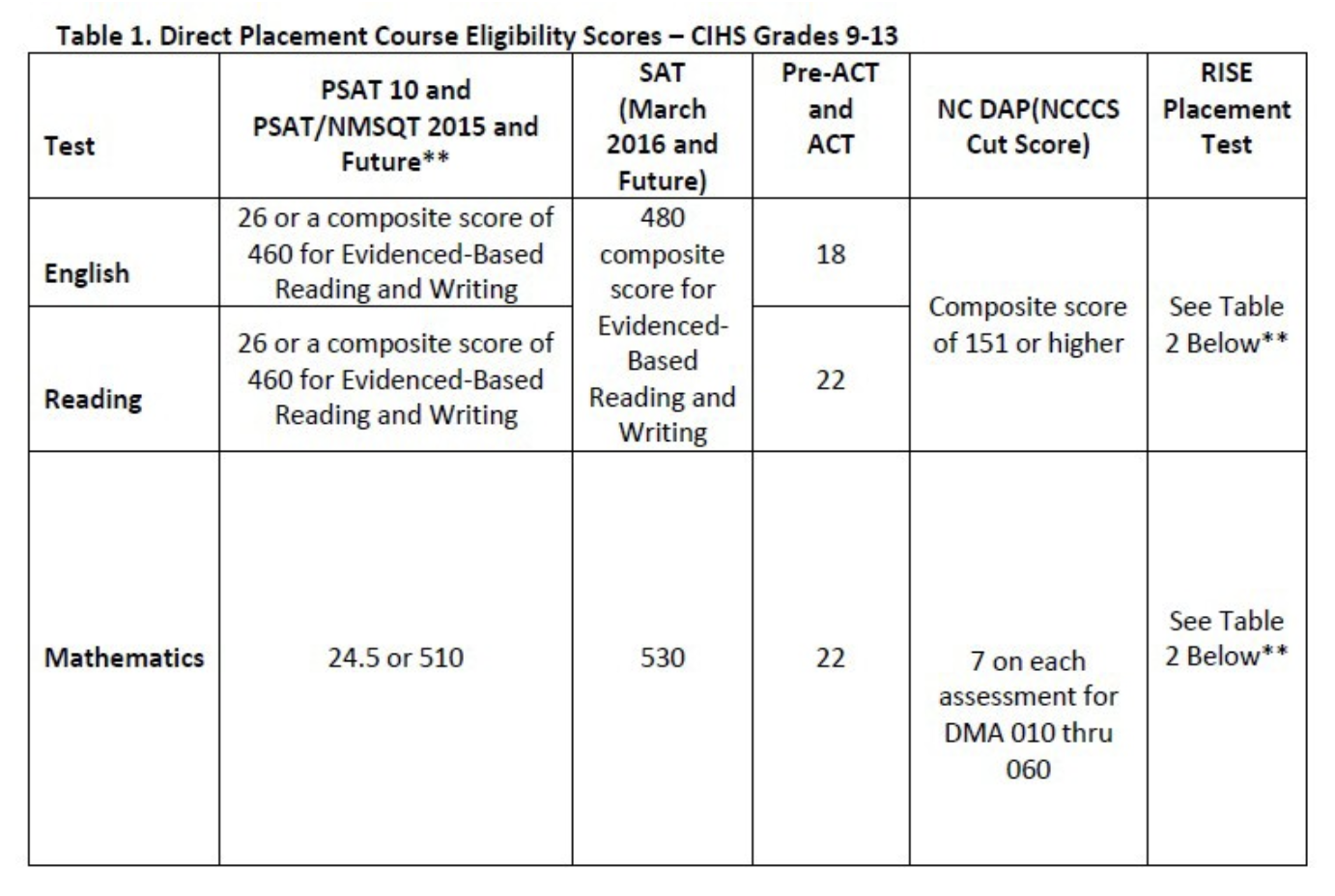
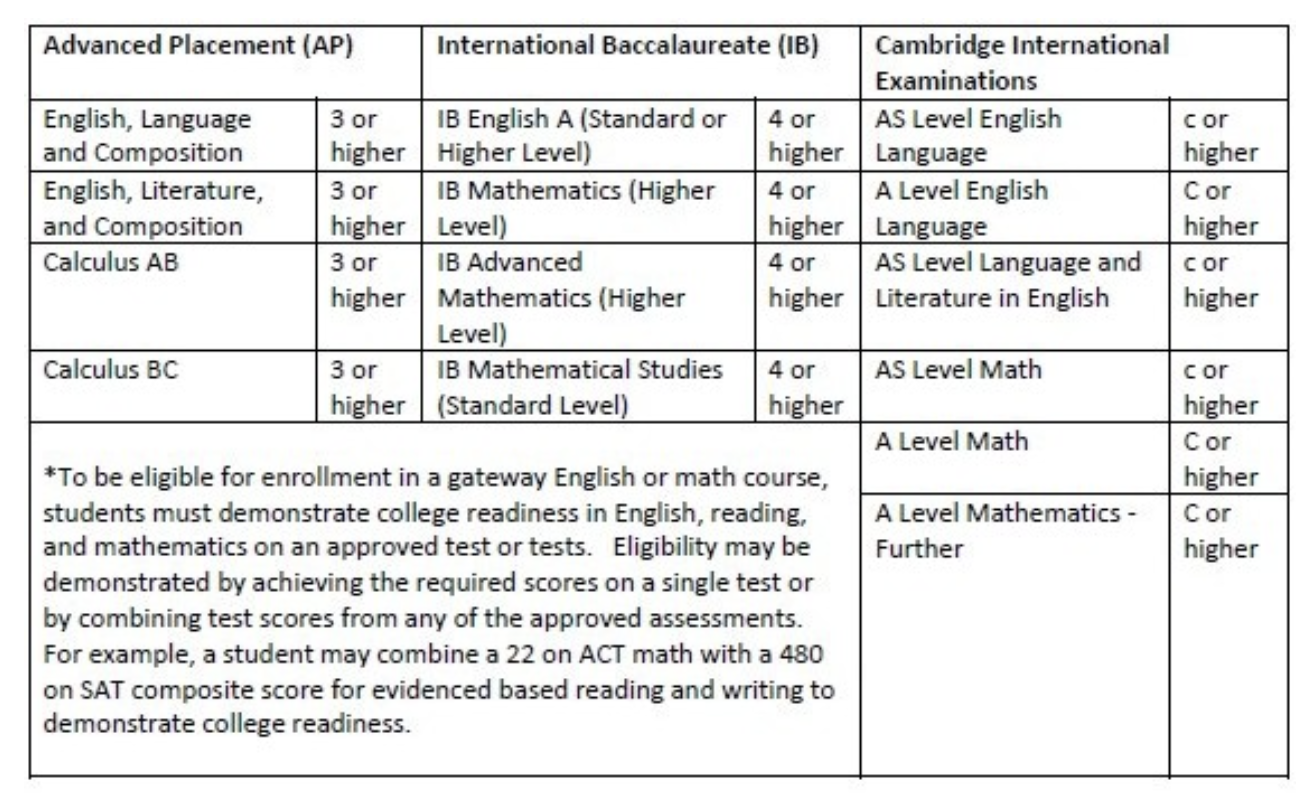
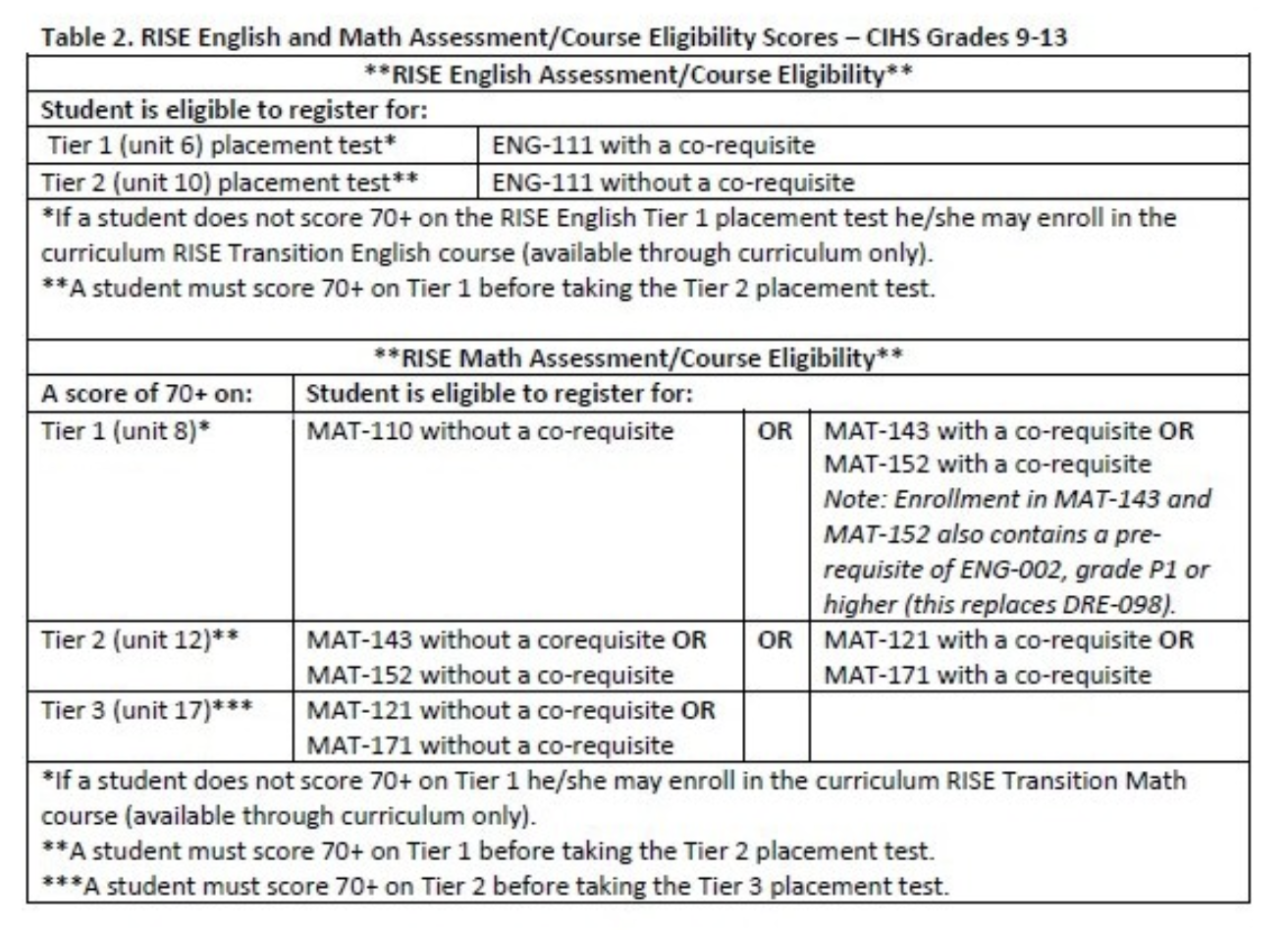
Cooperative Innovative High School Course Eligibility Infographs
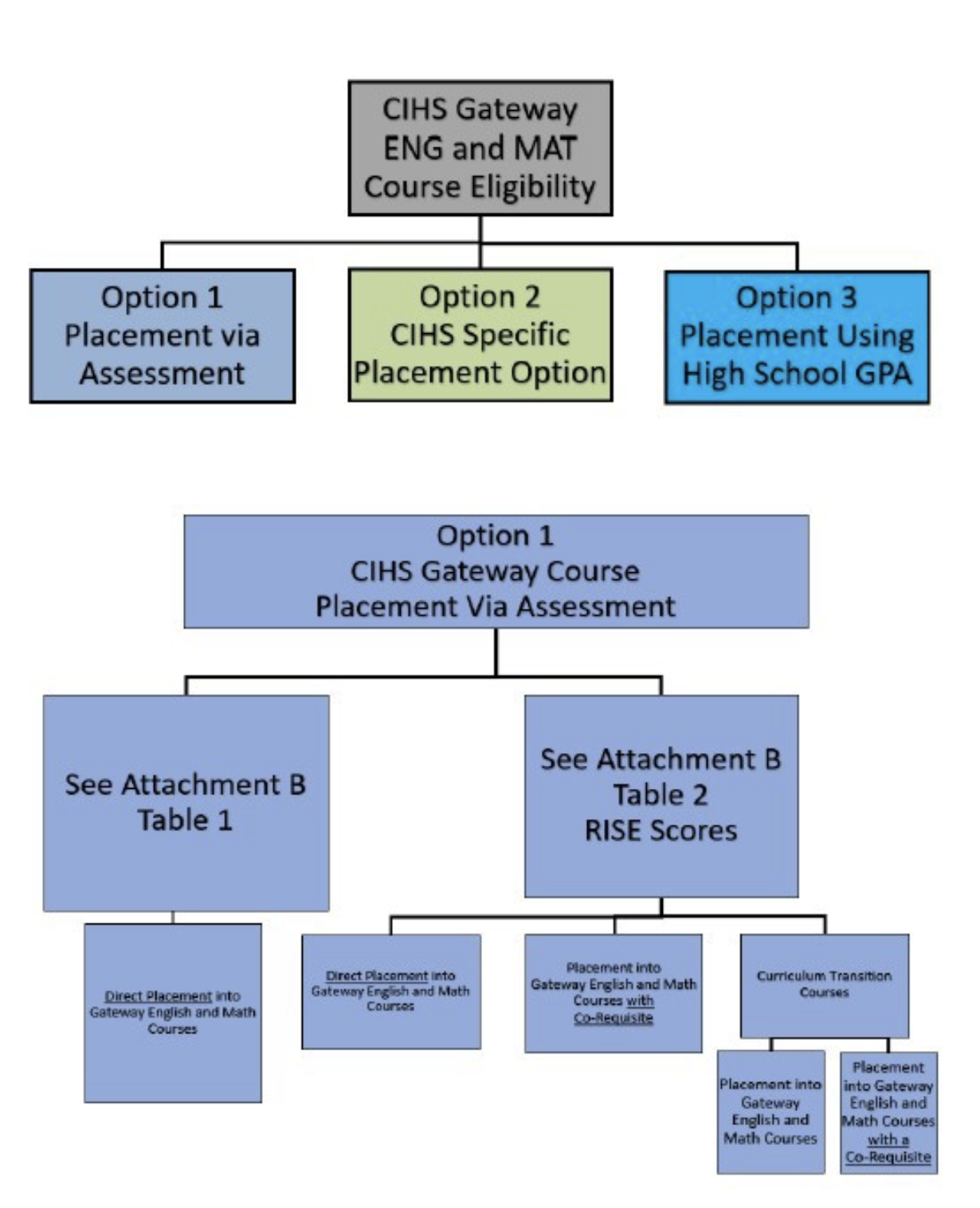
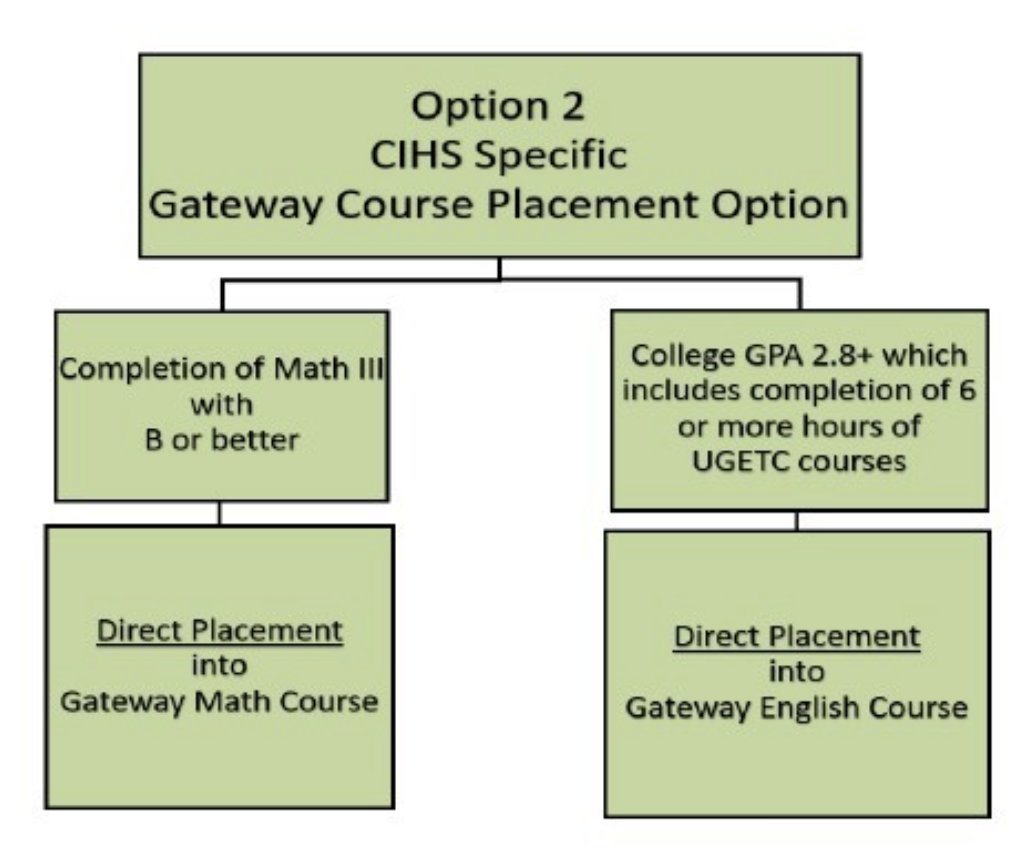
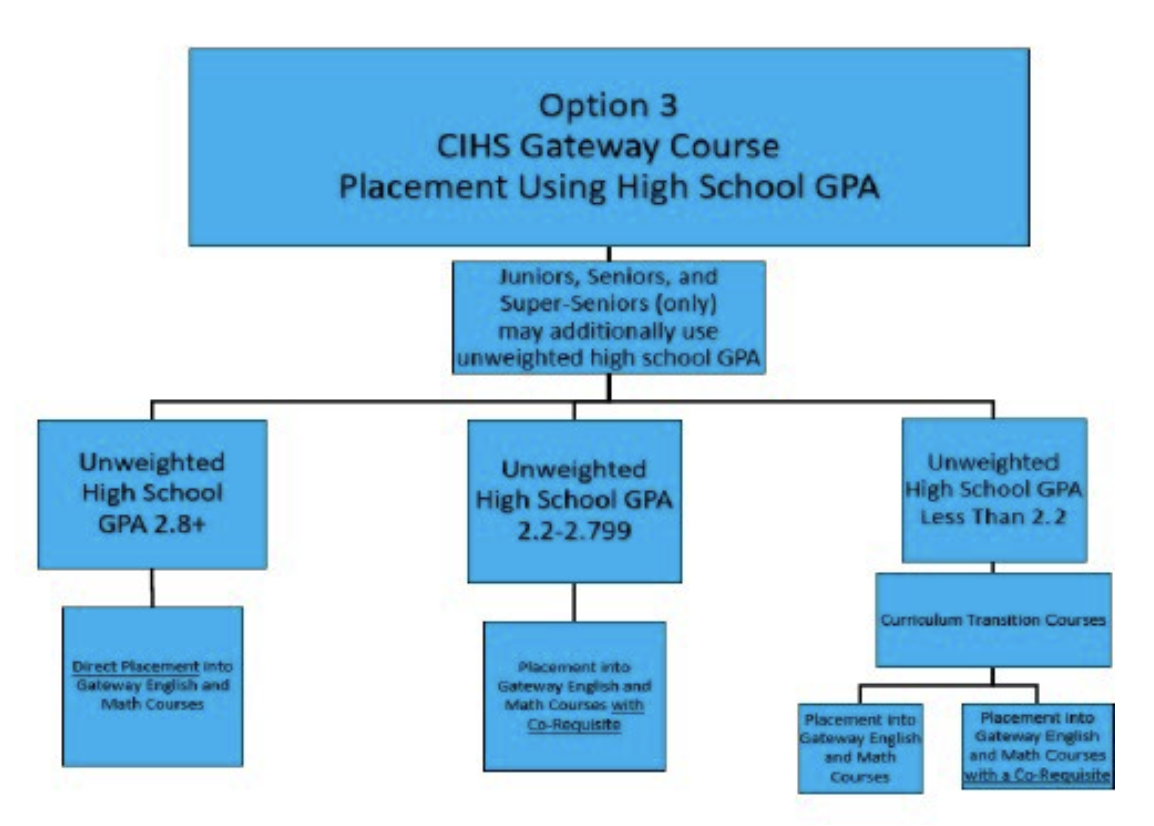
Adopted: 9-28-2017
Revised: 12-11-2019
Revised: 02-24-2020
Revised: 07-17-2020